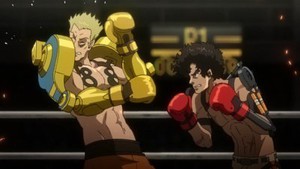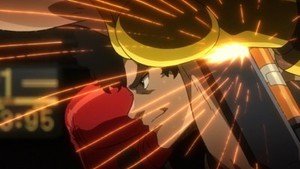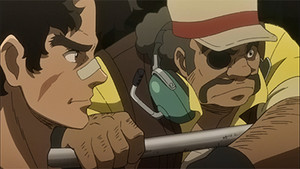The Spring 2018 Anime Preview Guide
MEGALOBOX
How would you rate episode 1 of
Megalobox ?
Community score: 4.6
What is this?
 In the not too distant future, boxing has become a sport enhanced by “Gear,” machine exoskeletons worn over the shoulders and arms to allow boxers to punch farther and harder than before. Known as “megalobox,” the sport is popular as both a regular sporting event and as one during which underground bets are laid, with dramatic differences between the fanbases. Junk Dog, a young megaloboxer, is struggling both to make a name for himself in the underground fights as well as with whether he's really happy with his current situation. When he hears that the upscale Shirato Group is sponsoring a worldwide megaloboxing tournament in a special arena, he's largely ambivalent, seeing it as both not worth it and beyond his grasp. But he's getting tired of the rigged fights he's forced to participate in. Will a chance encounter with Yuri, the reigning champ of the sport, make him change his mind? Megalobox is an original spin-off of Ashita no Joe and streams on Crunchyroll, Thursdays at 2:00 PM EST.
In the not too distant future, boxing has become a sport enhanced by “Gear,” machine exoskeletons worn over the shoulders and arms to allow boxers to punch farther and harder than before. Known as “megalobox,” the sport is popular as both a regular sporting event and as one during which underground bets are laid, with dramatic differences between the fanbases. Junk Dog, a young megaloboxer, is struggling both to make a name for himself in the underground fights as well as with whether he's really happy with his current situation. When he hears that the upscale Shirato Group is sponsoring a worldwide megaloboxing tournament in a special arena, he's largely ambivalent, seeing it as both not worth it and beyond his grasp. But he's getting tired of the rigged fights he's forced to participate in. Will a chance encounter with Yuri, the reigning champ of the sport, make him change his mind? Megalobox is an original spin-off of Ashita no Joe and streams on Crunchyroll, Thursdays at 2:00 PM EST.
How was the first episode?
 Nick Creamer
Nick Creamer
Rating:
Alright, now we're into the action. Megalo Box was another of my top contenders coming into this season, largely based on its alluring promotional trailer. That trailer promised a detail of art design that you almost never see in anime, along with a generally attractive aesthetic, smooth animation, and an overarching sense of natural cool. So does any of that make it through into the anime proper?
Yep, it all does. If you have any fondness for action shows, you can rest assured that Megalo Box is the real deal. Its current quality puts it on track to compete with My Hero Academia and Golden Kamuy, and you should probably go watch it.
The most striking feature of this Ashita no Joe anniversary project is undoubtedly its incredibly detailed, intentionally uneven linework and backgrounds. From the cracks of the dusty road to the grease-smears obscuring our view through windows, every detail of Megalo Box is given a textural complexity that really brings the world to life. The layouts are dynamic, and the frayed linework of the characters makes them fit naturally into this decaying world. Those characters' own designs occupy a unique and surprisingly natural compromise between classic Ashita no Joe designs (most clearly evoked through characters like the current champion Yuri) and modern design sensibilities, further bolstering the distinctiveness of Megalo Box's look. Top all that off with relatively fluid animation, and you have the best-looking show of the season so far.
The story all that beauty is being applied to seems just as engaging, if a little more standard. This episode's narrative moves in broad, iconic strokes, painting a classic portrait of the upper-class city dwellers versus our hero Junk Dog, who wastes his boxing talents throwing fights in the slums. The familiarity of this story's narrative beats is actually put to work throughout this episode; we don't need a detailed explanation of what not having a citizenship ID means, all we need is a pan up from Junk Dog's sagging home to the shimmering distant city. Megalo Box whittles its narrative down to classic beats and jumps with purpose between them, with only the show's odd predilection towards little monologues by side characters offering any pacing speed bumps. The show offers just as much narrative as it needs to, letting the richly detailed world, propulsive music, and Junk Dog's burning eyes do the rest.
All in all, outside of those weird little pacing trip-ups, I have basically no complaints about this episode. Megalo Box clearly understands pacing and storytelling economy, the tactical dynamics of Junk Dog's fights are clear even when he's forced to throw matches, and the visual execution is top notch. The only question now is if Megalo Box possesses the animation chops to really sell its big fight sequences, something we'll presumably be learning during next week's showdown with Yuri. If the show clears that hurdle and can somehow maintain this level of visual execution, it'll be a consistent highlight of the spring season.
 Theron Martin
Theron Martin
Rating:
There are few series this season that I suspected might come out of the gate with a sizzling-hot premiere, but this was not one of them. The premise suggested a much sillier extrapolation on a real sport that I've never had much interest in (boxing), not to mention being the 50th anniversary production for a franchise that has never interested me (Ashita no Joe). But I was completely floored by how vibrant and involving this show turned out to be.
The first thing that distinguishes Megalobox is its visuals. Nothing else in anime looks like it, and few others convey such a gritty sense of realism in their backgrounds. This is set in a future that is supposed to be run-down and ruined, and everything about the visuals conveys that, whether it's Junk Dog's bandaged face, the omnipresent graffiti, or the earthy look of the attendees at the underground fights. Compared to them, the elegant lady who runs the Megalonia looks like a being from another world, which was almost certainly intended. The animation is easily going to be among the season's finest efforts, with dynamic and interesting shot selections and an impressively effective conveyance of the raw violence inherent to the sport, to say nothing of how it's souped-up by robotic augmentation. Frankly, I'm amazed that this was put together by a first-time director, who also did the conceptual design. He was also responsible for the impressive design work for Kabaneri of the Iron Fortress, so You Moriyama might be a name to remember going forward.
The visuals only help to highlight the impact of the work, as does the sharp pulsing musical score that drives every ounce of tension possible into the fights. The story is thoroughly gritty as well, about an underground boxer who's just barely making do by throwing fights he's capable of winning. Since he can't do what he wants in the ring, he vents his frustration by riding dangerously on his motorcycle, and he finally reaches his breaking point by the end. For him, the intimidation factor of facing the champ is irrelevant; by that point the audience can easily sympathize that this is his chance to fully show off what he can do, even if that does mean losing. All of this comes across with an intensity that can't be matched in most other anime.
In short, if you were ready to pass on this one because you thought it was just another boxing series, I recommend that you give it a try. It will likely surprise you.
 James Beckett
James Beckett
Rating:
TMS Animation is two-for-two so far this season, having produced both of the standout shows I've seen so far in an already strong season. I originally thought it was going to be difficult for anything to dethrone Lupin III Part 5's top spot on my watchlist, especially so early in premiere cycle, but then Megalobox came along and sucker-punched its way into my heart. I had only barely heard of Ashita no Joe going into this episode, but it didn't take long for this futuristic reimagining of the classic sports manga to prove that every sport becomes a thousand times better when you combine it with robotic exoskeletons.
I don't know what impressed me more about this episode, the fluid and weighty fight choreography that will hopefully become a staple of the season, or the fact that this premiere managed to be so successful despite featuring a relatively small amount of action scenes. Much of this episode was devoted to setting the stage of the dusty dystopia that Junk Dog finds himself wasting away in, as he's forced to throw his Megaloboxing matches to satisfy crooked gamblers instead of pursuing the honorable victories he knows he could claim. While the plotting in the episode is relatively straightforward, You Moriyama's incredibly confident direction imbues Junk Dog's introduction with a hazy quality that elevates the episode's production. As our battered protagonist drifts in and out of wistful daydreams and bloody beatings, we establish an emotional connection with him that is much more effective than a more direct approach might have achieved.
I would also be remiss if I didn't mention the score by mabanua, which is next-level good. As far as I know, his only other anime work consists of contributions made to the OST of Kids on the Slope, and his solo work for Megalobox couldn't be more different. This is a rhythmic, hypnotic synth score that's heavy on bone-rumbling bass lines and infectious hooks, and I couldn't get enough of it. It says a lot about the marriage of manbua's music and Moriyama's directorial style that one of the episode's most effective scenes technically qualifies as an anticlimax, where Junk Dog and Yuri almost come to blows on a rain-soaked bridge before the mysterious Yukiko calls off the fight. It's a tense and wonderfully taut bit of storytelling that makes their second encounter in the final moments of the episode that much more exciting.
It's the success of Megalobox's first cliffhanger that ultimately cements Megalobox's success in my mind. For most introductory episodes, my enthusiasm will range from dread to indifference to healthy but cautious optimism. Having covered so many series over the past couple of years, I've become wary of getting too excited by only a single episode, as I've seen all too often how quickly a promising premiere can go south. With Megalobox though, I was desperate for more of this story by the time the credits began to roll. I can only hope the show doesn't go on to break my heart too badly, because it only took this one half-hour for me to be all-in on whatever comes next.
 Paul Jensen
Paul Jensen
Rating:
With all the clean, pretty sports titles we get these days, it's nice to see a series that's willing to get gray and grimy. Megalobox has visual style and attitude in abundance, going all-in on its downtrodden vision of the future. The streets are dirty and the walls are covered in graffiti, at least in the part of town where our protagonist lives. The fact that there's a shining, well-to-do city within sight just adds to the beaten-down underdog mood by creating an obvious visual contrast between social classes. This early world building is already paying off in the show's first episode, as it gives Junk Dog something to both rage against and aspire to.
Junk Dog himself sits somewhere in between an amateur street punk and a professional fighter. He's a veteran of underground boxing, and he's convinced he'd be able to win all of his matches if he wasn't being forced to throw them. Regardless of whether or not this self-assessment is accurate, it's made him restless to the point of self-destruction. The overriding message here is that Junk Dog wants (and perhaps even needs) to have a real fight with a worthy opponent. Desperately wanting to punch someone in the face may not sound like the noblest motivation out there, but for now the focus seems to be on making him a compelling character, rather than a charismatic one. If that's the goal here, then this episode is pretty successful; I don't necessarily want to sit down for a beer with Junk Dog, but I do want to see how his story plays out.
That story also has plenty of good antagonists. Junk Dog's manager seems to value him as a business partner, but only as long as he's willing to bring in the cash by losing fixed fights. He's the kind of slimy, amoral character that embodies the world our hero's mired in. Then we have Megalonia organizer Yukiko and her champion fighter Yuri, who both inhabit interesting spaces in the story at the moment. Despite being in an obvious position to look down on Junk Dog, Yukiko acts like a surprisingly decent human being during their first encounter. Whether that's genuine sympathy or just calm professionalism remains to be seen, but it's interesting that Yuri also acts unexpectedly like a non-jerk. He seems to view Junk Dog as a worthwhile opponent, rather than just someone who needs to be taught a lesson. In any case, I really like the contrast between their Gear designs in the final scene; that alone says more about the vastly different worlds Junk Dog and Yuri inhabit than any amount of dialogue, and the outcome of their first fight will likely hold a lot of thematic significance.
At the moment, Megalobox has an abundance of style and a modest amount of substance. It's gathered a lot of cool and compelling pieces and placed them into the framework of a typical boxing story, but the plot hasn't really moved beyond the simple sentiment of wanting to fight someone. Thematic depth can be added with time, though, and this show has done enough to stand out from the crowd that I'll gladly give it a few weeks to push its narrative beyond the initial premise. Even if you're not normally a fan of darker sports stories, the art style alone makes this one worth checking out.
 Rebecca Silverman
Rebecca Silverman
Rating:
There are a few sports shows putting in an appearance this season, but Megalobox looks like it might be the darkest of the bunch. Spun off from the classic Ashita no Joe boxing manga, the series takes place in a future that isn't so much dystopian as beaten down. Everything is a sort of dingy brown, as if the world has been about used up and no one can be bothered to do anything about it, and underground fights, be they dog or human, are the way the masses entertain themselves. It's deliberately dark and gritty, and this episode truly revels in that, even as it goes out of its way to avoid showing too much blood or violence.
That's actually a little weird in a show about a relatively violent sport like boxing, but given that most of the despair in the episode is in Junk Dog's mind, it does work. There's plenty of evidence that things are grim, with a scene where Junk Dog runs his hand along a trail of blood smearing the hallway to the ring standing out as particularly effective. We don't actually need to see the grim consequences of guys strapping enhanced exoskeletons to their arms before pummeling each other to understand them, although it might have helped to drive home the fact that the fights Junk Dog is participating in have very little actual skill involved. He's been throwing matches he could (purportedly) easily win, which implies that his opponents may not be particularly good at what they're doing. We can see that Junk Dog is just blocking until he's told to take a hit and collapse, so strategy doesn't go much beyond that.
That's clearly meant to contrast with the introduction of Yuri at the end of the episode. He's the reigning champion of the sport, and he and Junk Dog meet when Junk Dog, giving in to his usual self-destructive impulses, drives his motorcycle onto an unfinished private road. (I can't shake the feeling he might have been looking for another cliff to drive off of.) Yuri sees something in Junk Dog that he likes, and that may ultimately lead to a sort of mentor/rival status for him as Junk Dog realizes that there's more he could be doing with his skills than taking the fall for an indebted partner. How these two characters begin to interact next week could give us a very good idea of the tone for the series to come, and it should bear keeping an eye on.
I don't want to forget to mention how interesting Yukiko Shirato's reaction to meeting Junk Dog is as well. She's the corporate sponsor of the upcoming Megalonia competition and Yuri's sponsor (or owner, as he calls her, drawing a line between a stray junk(yard) dog and a pampered pet), and it's her private road Junk Dog turns down, subsequently almost running her over. Instead of breaking out the “oh ho ho” laugh and being nasty about it, Yukiko is fairly sympathetic to Junk Dog, offering to pay for his medical care and repairs to his bike (and Gear) and preventing him from fighting Yuri in the heat of the moment. Granted, that last could also be protecting her own asset, but given that Junk Dog just crashed his motorcycle, she could also be concerned about what would happen to him if he fought in that state. It adds to the show's interesting start, and it should be worth giving it a couple more episodes to see how it proceeds from here.
discuss this in the forum (369 posts) |
this article has been modified since it was originally posted; see change history
back to The Spring 2018 Anime Preview Guide
Season Preview Guide homepage / archives